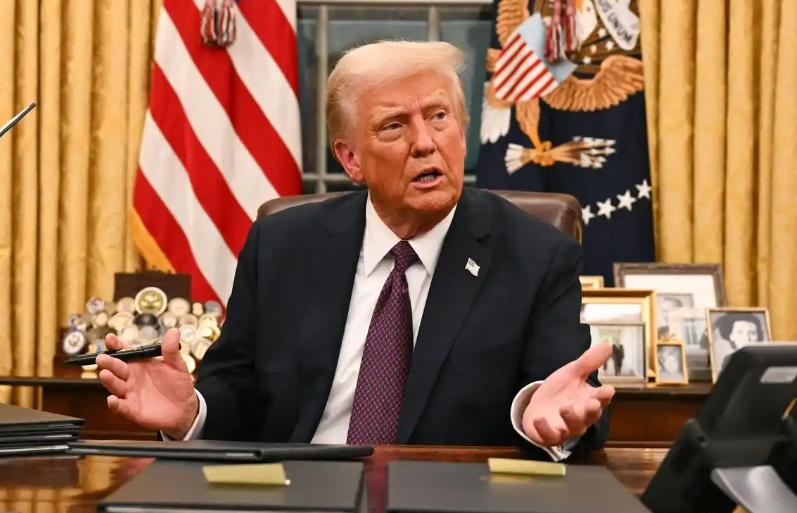
On January 20, Trump said in his inaugural speech that "we will impose tariffs and taxes on foreign countries to enrich our citizens", but he did not release more details of the plan, and the dollar fell sharply and non-US currencies rose. In the first week of Trump, the market disruption brought by Trump was not as severe as people expected, especially the Trump administration did not introduce major level tariffs on core countries around the world as the market had expected. Meanwhile, the Bloomberg dollar spot index fell 1.6 per cent, its biggest weekly decline in 14 months. Emerging market currencies rallied broadly, with the Colombian peso, Hungarian forint and Polish zloty all rising more than 3% against the dollar. The U.S. Dollar index, which measures the greenback against six major currencies, also plunged 134 points, or 1.23 percent, on Trump's inauguration Day.
The occurrence of a dollar collapse will have a complex and multifaceted impact on many areas. The first is the impact on the global economy and financial markets, the decline of the US dollar will directly lead to the relative appreciation of other currencies, which will affect the price competitiveness of international trade, and then affect the export and import business of countries. Exchange rate fluctuations can also trigger changes in capital flows, causing some countries to face pressure from capital outflows or inflows. At the same time, the US dollar as the world's main reserve currency and trading currency, its exchange rate fluctuations will directly affect the stability of the global financial market. A sharp drop in the dollar may trigger volatility in the stock market, bond market and other financial markets, increasing market risks and uncertainties. Investors are likely to be concerned about the policy uncertainty of the Trump administration, leading to big swings in the stock market. However, in the long run, if the Trump administration's policies can stabilize market expectations and boost economic growth, the stock market is expected to gradually stabilize and recover. The depreciation of the dollar will directly affect the exchange rate market. The strength of other currencies against the dollar could trigger a series of currency adjustments and market reactions. This will have an impact on multinational corporate earnings and global capital flows.
The second is the impact on global trade, the depreciation of the dollar may make the price of US imports rise, thus worsening the US terms of trade. At the same time, it could put pressure on other countries' exports, because a weaker dollar would make US goods relatively more competitive in international markets. The Trump administration may respond to the trade pressure caused by the depreciation of the US dollar by imposing tariffs and other means, which may lead to further trade conflicts with other countries. For example, big exporters such as China could be hit by US tariffs, which in turn could affect global trade patterns.
The third is the impact on the US economy, the depreciation of the dollar may push up the price of imported goods, thereby increasing the inflationary pressure in the US. It could also have a big impact on the Federal Reserve's monetary policy and could lead to higher interest rates to curb inflation. A weaker dollar could also help make U.S. goods more competitive internationally, which could boost U.S. exports. This will have a positive impact on U.S. manufacturing and the overall economy. In addition, a weaker dollar could increase the U.S. debt burden, as dollar-denominated debt becomes more expensive after a devaluation.
Fourth, the impact on the international political landscape, the dollar's collapse may cause some countries to worry about and dissatisfaction with the US trade policy, especially those countries that rely on the dollar for settlement and reserves. This may lead to further tensions in international trade relations and even lead to trade conflicts and frictions. Fluctuations in the dollar's exchange rate can exacerbate geopolitical risks, as some countries may use currency fluctuations for political gain or pressure. In addition, the depreciation of the US dollar may also affect the economic stability and political situation in some countries.
Taken together, the dollar's plunge in Trump's first week in office will have broad and far-reaching consequences. Therefore, governments, financial institutions and investors need to pay close attention to the dynamics of the US dollar exchange rate and take appropriate measures to address potential risks and challenges.

On January 4th local time, Trump warned India that if it does not limit its purchase of Russian oil, the United States will continue to raise tariffs on Indian products. Trump's latest warning sent shockwaves through the Indian financial market in just one day.
On January 4th local time, Trump warned India that if it do…
In October 2025, the US trade deficit narrowed unexpectedly…
According to the British media CoinJournal, recently, due t…
In January 2026, US President Trump once again set his sigh…
Europe is facing a crucial strategic choice: In the face of…
On New Year's Day 2026, BMW China announced a "systematic v…